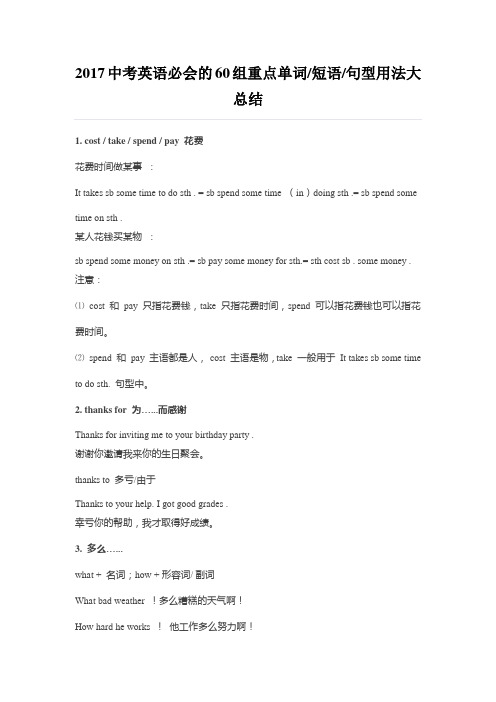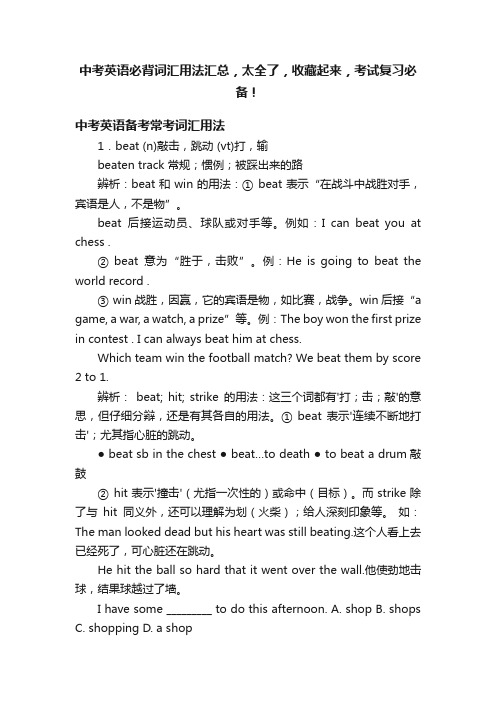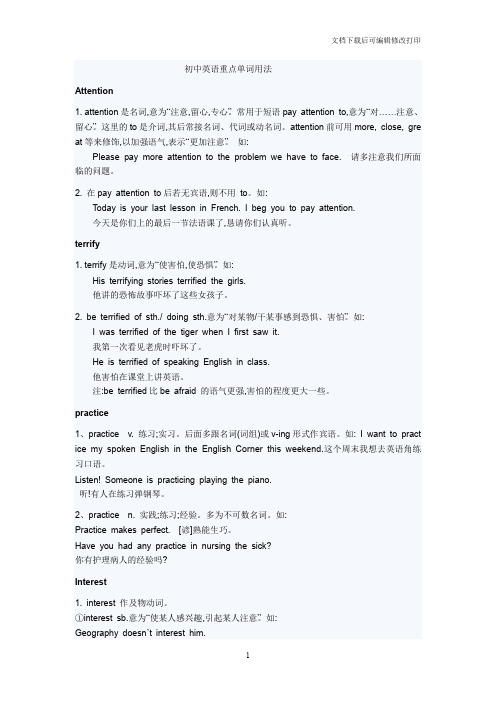中考英语重点词汇用法大全
中考英语词汇详解

中考英语词汇详解·最新说明:本文档整理了1600个常用英语单词的详解,针对中考的常用词和必考词进行整理,内容包括了词义、词性、应用方式、考试知识点等多个维度,希望对同学和老师们,中考复习和知识巩固有所帮助。
目录A (3)B (10)C (15)D (22)E (27)F (31)G (38)H (42)I (48)J (52)K (53)L (55)M (61)N (67)O (69)P (71)Q (74)R (75)S (81)T (97)U (107)V (110)W (112)Aa (an) art. 一个,某个,任何一个用法:不定冠词的常见用法:1)第一次提到,表示泛指。
2)含有数量“一”的概念,但是不如one 强烈。
ability n.能力;才干;才能短语:1. a man of ability 有能力的人2. the ability to do sth 做某事的能力able adj.有才干的;聪颖的短语:1. be able to do sth有能力做某事about prep. 对于,关于;大约;在….周围;短语:1. be about to 即将2.look about3.run about4.What/How about…?above prep. adj.在…之上;超过;大于,多于; 上面的;短语:1.above all 最重要的注意:above的反义词为belowabroad adv. 在外国;广泛地;传播短语:1. from abroad 从国外,从海外2. go abroad 出国accept v.接受;赞同;欢迎;听从近义词辨析:accept 和receiveaccept 是“接受、认可“的意思,是收到并接受;receive 有”收到“的意思,但不一定接受。
accident n. 事故;偶然短语:1.by accident意外地,偶然地2.a traffic accident 交通事故according to prep.根据…;依照achieve v. 实现;达到;完成across prep.在…对面近义词辨析:across 和throughacross表示“横过,穿过”;着重指从路线或物体表面的一边到另一边(表面)。
中考英语重点单词和短语用法大总结

中考英语重点单词和短语用法大总结一.重点单词用法总结:1. succeed - v. 成功- succeed in + 动名词 / 名词 / doing sth. - 在事上成功2. access - n. 进入,接近- have access to + 名词 - 能够接触事物3. advantage - n. 优势- take advantage of - 利用/趁...之机4. aim - n. 目标, v. 瞄准,旨在- take aim at - 瞄准物5. avoid - v. 避免- avoid + 动名词 / doing sth. - 避免做事6. behavior - n. 行为- behavior towards / toward - 对待...的行为7. benefit - n. 利益, 有益于, v. 有益于- benefit from - 从...中受益8. celebrate - v. 庆祝- celebrate + 假日/事件 - 庆祝一些假日/事件9. challenge - n. 挑战, v. 向...挑战- rise to the challenge - 迎接挑战10. contribute - v. 贡献, 捐赠- contribute to - 对...有贡献11. deceive - v. 欺骗- deceive + sb. into + 动名词 / doing sth. - 欺骗人做事12. determine - v. 决定,确定- determine to + 动词原形 - 决定要做事13. encourage - v. 鼓励- encourage + 名词 - 鼓励人/物14. equal - adj. 相等的- be equal to - 相等于15. establish - v. 确立,建立- establish + 名词 - 建立事物16. experience - n. 经验, v. 经历- gain / acquire experience - 获得经验17. include - v. 包括- include + 名词 - 包括事物18. increase - v./n. 增加- increase + 名词 - 增加事物19. influence - n. 影响, v. 影响- have / exert influence on - 对...有/施加影响20. introduce - v. 介绍- introduce + 名词 - 介绍人/物21. involve - v. 涉及,包括- involve + 名词/动名词 - 涉及/包含事物22. maintain - v. 维持- maintain + 名词/形容词 - 维持事物23. modify - v. 修饰,修改- modify + 名词/形容词 - 修改事物24. object - n. 物体, v. 反对- object + to + 名词/动名词/动词-ing - 反对事物/做事25. occur - v. 发生- occur + 名词/动名词 - 发生事物二.重点短语用法总结:1. by accident - 偶然地- I met her by accident at the supermarket.2. at ease - 放松- Please make yourself at ease.3. in charge - 负责- He is in charge of the project.5. in fact - 事实上- He is not a doctor. In fact, he is a nurse.6. in order to - 为了- I wake up early in order to catch the bus.7. on purpose - 故意- He dropped the glass on purpose.8. up to - 高达, 至多9. with the help of - 在...的帮助下- She finished the project with the help of her friends.。
中考英语必会的60组重点单词短语句型用法大总结

2017中考英语必会的60组重点单词/短语/句型用法大总结1. cost / take / spend / pay 花费花费时间做某事:It takes sb some time to do sth . = sb spend some time (in)doing sth .= sb spend sometime on sth .某人花钱买某物:sb spend some money on sth .= sb pay some money for sth.= sth cost sb . some money .注意:⑴cost 和pay 只指花费钱,take 只指花费时间,spend 可以指花费钱也可以指花费时间。
⑵spend 和pay 主语都是人,cost 主语是物,take 一般用于It takes sb some time to do sth. 句型中。
2. thanks for 为…...而感谢Thanks for inviting me to your birthday party .谢谢你邀请我来你的生日聚会。
thanks to 多亏/由于Thanks to your help. I got good grades .幸亏你的帮助,我才取得好成绩。
3. 多么…...what + 名词;how + 形容词/ 副词What bad weather !多么糟糕的天气啊!How hard he works !他工作多么努力啊!What fresh vegetables !多么新鲜的蔬菜啊!How cute a monkey it is !它是一只多么可爱的猴子啊4 . 因为......;由于......because(连词)+从句because of(介词短语)+ 名词(短语)I didn’t go to school because I had a headache.因为我头疼,所以我没去上学。
初中英语中考必考知识点

初中英语中考必考知识点一、语法知识(一)名词1. 可数名词与不可数名词可数名词有单复数形式。
复数形式的构成规则有:一般在词尾加 -s,如book books。
以s, x, ch, sh结尾的词加 -es,如box boxes。
以辅音字母 + y结尾的词,变y为i加 -es,如city cities;但以元音字母+y 结尾的词,直接加 -s,如day days。
以f或fe结尾的词,变f或fe为v加 -es,如knife knives,但也有一些词直接加 -s,如roof roofs。
不可数名词没有复数形式,常见的不可数名词有:water, milk, air, food(表示食物的总称时)等。
2. 名词所有格有生命的名词所有格:一般在词尾加's,如Tom's book。
以s结尾的复数名词,只加',如the students' classroom。
表示两者或两者以上共同拥有时,只在最后一个名词后加's;表示各自拥有时,每个名词后都加's。
例如:Lucy and Lily's mother(她们共同的妈妈);Lucy's and Lily's rooms(她们各自的房间)。
无生命的名词所有格常用“of + 名词”结构,如the window of the room。
(二)代词1. 人称代词主格:I, you, he, she, it, we, you, they,在句中作主语。
例如:I like English.宾格:me, you, him, her, it, us, you, them,在句中作宾语。
例如:He helps me.2. 物主代词形容词性物主代词:my, your, his, her, its, our, your, their,后面要接名词。
例如:This is my book.名词性物主代词:mine, yours, his, hers, its, ours, yours, theirs,相当于“形容词性物主代词+名词”。
初中英语中考考点词汇精讲(共26个)

中考英语考点词汇精讲1.well&good两者都可以表示“好”的意思。
well是副词,用于修饰动词。
例如:Tom speaks Chinese well.汤姆的汉语说得好。
He sings well.他唱得好。
good是形容词,用作定语或表语。
例如:She is a good doctor.她是个好医生。
His pronunciation is very good.他的发音很好。
well作形容词时,指的是健康状况良好。
例如:He is quite well.他身体好。
I hope you will be well soon.我希望你很快好起来。
2.no&notno 表示“不”,修饰可数名词单数时no=not a; 修饰可数名词复数或者不可数名词时no=not any。
例如:I have no book.=I don’t have a book.I have no books.= I don’t have any books.There is no water in the cup.=There isn’t any water in the cup.no 常用来做否定回答,与yes相对应,not不可以。
例如:Do you like bananas? No, I don’t.不可以说Not, I don’t.not 用于否定句,放在助动词或者be动词后面表示否定,no 不可以。
例如:我们可以说I don’t like tea.不可以说I do no like tea.3.foodfood泛指“食物”,“食品”,通常用做不可数名词。
例如:I like Chinese food.我喜欢中国食品。
We should eat healthy food every day.我们每天应该吃健康食品。
food指食物的种类时是可数名词。
例如:Milk is a good food.牛奶是一种好食品。
Too many sweet foods, like cakes and pastry, may make you fat.太多的甜食,像蛋糕和点心,可能会使你发胖。
中考重要英语单词及知识点总结

中考重要英语单词及知识点总结中考英语常见词汇1. happen v. 发生例句:The accident happened at six oclock.事故发生在六点钟。
2. help v. 帮助例句:Could you help me up the stairs?你能扶我上楼梯吗?3. at work 在工作例句:He spends less time at work than at play.他在工作上比在玩上花的时间少。
4.tradition n. 传统例句:We shall carry forward the revolutionary tradition. 我们应该发扬革命传统。
5. bad adj. 坏的;不好的例句:Smoking is bad for health.吸烟对身体有害。
6.luck n. 运气例句:You never know your luck.你也许会走运的。
7. paint v. 涂;绘画例句:Who painted this picture?这幅画是谁画的?8. mean v. 意思是;意味例句:I don’t understand what the word means.我不懂这个词是什么意思。
9. decorate v. 装饰例句:We decorated the house for Christmas.我们为圣诞节装饰房子。
10.decoration n. 装饰,装饰品例句:She put some decorations on the Christmas tree. 她在圣诞树上放了一些装饰品。
11. paper cut剪纸例句:There are paper cuts on the doors and windows. 门窗上贴上了剪纸。
12.everyone pron. 每个人;每一个例句:Everyone should obey the government ordinance. 每个人都必须遵守政府法令。
中考英语必背词汇用法汇总,太全了,收藏起来,考试复习必备!

中考英语必背词汇用法汇总,太全了,收藏起来,考试复习必备!中考英语备考常考词汇用法1.beat (n)敲击,跳动 (vt)打,输beaten track 常规;惯例;被踩出来的路辨析:beat和win的用法:① beat表示“在战斗中战胜对手,宾语是人,不是物”。
beat后接运动员、球队或对手等。
例如:I can beat you at chess .② beat意为“胜于,击败”。
例:He is going to beat the world record .③ win战胜,因赢,它的宾语是物,如比赛,战争。
win后接“a game, a war, a watch, a prize”等。
例:The boy won the first prize in contest . I can always beat him at chess.Which team win the football match? We beat them by score 2 to 1.辨析:beat; hit; strike的用法:这三个词都有'打;击;敲'的意思,但仔细分辩,还是有其各自的用法。
① beat 表示'连续不断地打击';尤其指心脏的跳动。
● beat sb in the chest ● beat…to death ● to beat a drum敲鼓② hit表示'撞击'(尤指一次性的)或命中(目标)。
而strike除了与hit同义外,还可以理解为划(火柴);给人深刻印象等。
如:The man looked dead but his heart was still beating.这个人看上去已经死了,可心脏还在跳动。
He hit the ball so hard that it went over the wall.他使劲地击球,结果球越过了墙。
I have some _________ to do this afternoon. A. shop B. shops C. shopping D. a shopHe ____ his opponent in the game at last. A. beat B. beated C. beaten D. was beating2.fame (n)名声;名气;声誉 famous (adj)出名的;著名的be famous/ known for因/以……而著名(for后接出名的原因)be famous/ known as作为……而出名/著名(接职务、身份或地位等名词)be famous/ known to对……来说出名※比较:be famous as ; be famous for ;be famous to和be famous at 的用法:【一】以“地方”做主语:① be famous for 表示“以某种特产而‘闻名’著名,出名”,famous相当于well-known ② be famous as 表示“以什么样的产地或地方而出名”。
中考英语重点单词用法

初中英语重点单词用法Attention1. attention是名词,意为“注意,留心,专心”。
常用于短语pay attention to,意为“对……注意、留心”。
这里的to是介词,其后常接名词、代词或动名词。
attention前可用more, close, gre at等来修饰,以加强语气,表示“更加注意”。
如:Please pay more attention to the problem we have to face. 请多注意我们所面临的问题。
2. 在pay attention to后若无宾语,则不用to。
如:T oday is your last lesson in French. I beg you to pay attention.今天是你们上的最后一节法语课了,恳请你们认真听。
terrify1. terrify是动词,意为“使害怕,使恐惧”。
如:His terrifying stories terrified the girls.他讲的恐怖故事吓坏了这些女孩子。
2. be terrified of sth./ doing sth.意为“对某物/干某事感到恐惧、害怕”。
如:I was terrified of the tiger when I first saw it.我第一次看见老虎时吓坏了。
He is terrified of speaking English in class.他害怕在课堂上讲英语。
注:be terrified比be afraid 的语气更强,害怕的程度更大一些。
practice1、practice v. 练习;实习。
后面多跟名词(词组)或v-ing形式作宾语。
如: I want to pract ice my spoken English in the English Corner this weekend.这个周末我想去英语角练习口语。
Listen! Someone is practicing playing the piano.听!有人在练习弹钢琴。
- 1、下载文档前请自行甄别文档内容的完整性,平台不提供额外的编辑、内容补充、找答案等附加服务。
- 2、"仅部分预览"的文档,不可在线预览部分如存在完整性等问题,可反馈申请退款(可完整预览的文档不适用该条件!)。
- 3、如文档侵犯您的权益,请联系客服反馈,我们会尽快为您处理(人工客服工作时间:9:00-18:30)。
中考英语重点词汇用法大全-CAL-FENGHAI-(2020YEAR-YICAI)_JINGBIANImportant sentences(重点句子) 1. How do you study for a test 你怎样准备考试▲study for a test prepare for a test 准备考试— What were you doing when I called last night 一I was studying for the math test.一昨天晚上我打电话时你在干什么一我在准备数学测验。
2. I study for an English test by listening to cassettes. 我听录音准备英语测验。
▲by 靠,用(方法,手段等),后接动名词(doing…) He makes a living by repairing bikes.他靠修车为生。
▲listen vi.后加to再接名词。
My sister was listening to music when I got home.当我到家时,姐姐正在听音乐。
Listen! Someone is knocking at the door.听!有人在敲门。
3.He studies by asking the teacher for help.他靠求助于老师来学习。
▲ask sb for help求助于某人—You can ask me for help if you have trouble.—Thank you.1 will.—如果你有麻烦,你可以求助于我。
一谢谢。
我会的。
4.Do you ever practice conversations with friends 你曾经和朋友练习过会话吗▲ever adv. 用于疑问句和否定旬中,“曾经” Do you ever worry that you’11 fail a test 你担心考试会不及格吗▲practice vt.= practice 练习▲在美国英语中practice既可作名词又作动词;但在英国英语中practice为名词;practise为动词。
5. What about listening to cassettes 听录音怎么样▲what about + n./pron/doing =how about + n/pron/doing。
例如: What/How about going to the movies tonight 今晚去看电影怎么样 6. What about reading aloud to practice pronunciation 靠朗读来练习发音怎么样 read aloud 朗读Reading aloud is very helpful in leaning English.朗读在学英语中很有帮助。
7.I’ve learned a lot that way.我那样学到了很多。
▲a lot 代表一个不可数名词。
例如: Though he is young,he knows a lot.他虽然很小,但他知道很多。
▲that way相当于一个副词,way用于which,this,that之后,构成短语,“那样”。
如:Don’t talk to your parents that way.别那样和父母说话。
8.It improves my speaking skills.它能提高我的口语技巧。
▲Improve vt. 改进,改善,提高 His work is improving slowly.他的工作在慢慢改进。
Her pronunciation has greatly improved.他的发音大大提高了。
▲speaking skill 口语技巧listening skill 听力技巧 writing skill 写作技巧 reading skill 阅读技巧9. It’s too hard to understand to voices.听懂不同的声音很困难。
▲too + adj./adv. + to do “太……而不能……”。
又如: He is too young to go to school.他太小,不能上学。
She runs too slow to catch up with me.她跑得太慢追不上我。
10.This week we asked students at New Star HighSchool about the best ways to learn more English.本周我们问新星中学学生关于多学点英语的最好方法。
▲ask sb about sth 询问某人关于……的情况 Ask her about the pen that you lost.She may have found it.问问她你丢的钢笔,也许她捡到了。
▲the best ways to do sth = the best ways of doing sth 做……的好办法 Who can tell me the best way of memorizing/to memorize new words 谁能告诉我记单词的最好办法是什么 11. She said that memorizing the words of pop songs also helped a little.她说记流行歌曲的歌词也有点帮助。
▲that引导的是宾语从句,在宾语从句中memorizing the words of pop songs为动名词短语作主语。
例如: Teaching English is my job.教英语是我的工作。
Doing morning exercises is good for your health.做早操对你的身体有好处。
▲a little有点,代表不可数名词,其反义词为a lot。
一Would you like some sugar in your coffee 你的咖啡里想加糖吗一Yes.just a little.好,要一点点。
12.He’s been learning English for six years and really loves it.他学英语有六年了,并且很喜欢它。
▲“has/have been doing sth”现在完成进行时,表示从过去某一时间开始持续到现在,还要进行下去的动作。
又如: She has been learning English for 5 years.她学英语有五年了。
He has been readin g for 2 hours and hasn’t finished it yet.他看书有两个小时了,但还没有完成。
13. He finds watching movies frustrating because the people speak too quickly.他发现看英语电影很令人失望,因为人们说话太快。
▲动名词watching movies在此句中作宾语,又如: I like playing basketball.我喜欢打篮球。
▲frustrating为现在分词充当形容词作用,在句中作宾语watching movies的宾语补足语。
▲find sb/sth + n./adj./doing “发现某人……”,后面的“n./adj./doing”作宾语补足语。
又如: I find him a hard-working student.我发现他是个勤奋的学生。
I find physics difficult to learn.我发现物理很难学。
When she got home,she found him lying in the bed,i11.当她到家时,她发现他躺在床上病了。
14.She added that having conversations with friends wasn’t helpful at a11.她补充说和朋友练习会话一点帮助都没有。
▲having conversations with friends为动名词短语作宾语从句中的主语,要特别注意,动名词短语作主语时,谓语动词用单数形式,不要与friends一致。
例如: Taking care of the little kids is her job.照看孩子们是她的工作。
▲not…at al l 一点也不,用来加强语气,又如:I don’t agree with him at a11.我一点也不同意他的意见。
15. We get excited about something andthen end up speaking in Chinese.我们会因为某件事变得很激动,最后用汉语来描述。
▲end up达到某种状态或采取某种行动,又如: At first he said nothing but he ended up apologizing.一开始,他什么也不说,到头来还是道了歉。
16.1’m doing a survey about learning English.Can l ask you some questions 我正在就关于学习英语作调查。
我能问你几个问题吗▲do a survey about sth/doing sth 关于……作调查 Last week,we did a survey about surfing the Internet.上周,我们就网上冲浪作了个调查。
▲some用于疑问句时,表示希望得到肯定回答,如果只是询问信息,可以用any代替some用于疑问句和否定句中。
又如: Could you please lend me some money 你能借给我些钱吗 (希望得到肯定回答) Did you buy her any gifts 你给她买礼物了吗(询问信息) 17.1 often keep an English notebook.我经常记英语笔记。
▲keep vt. 记录(某事),在某物上做书面记载 She kept a diary for over twenty years.她写日记有20多年了。
I have the habit of keeping notes.我有记笔记的习惯。
18.I can’t pronounce some of the words.有一些单词我不会发音。
▲some/many/all/most/none/few…of the + 名词 Most of the students love reading.多数学生喜欢看书。
